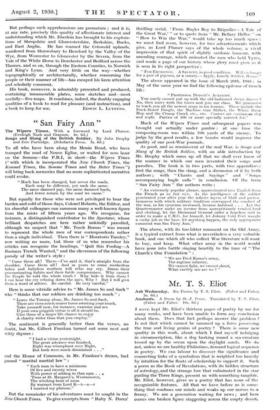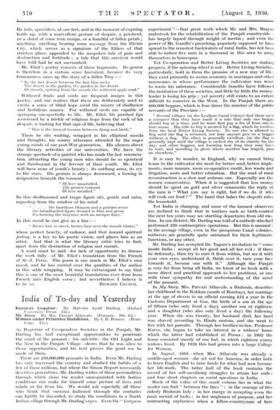Mr. T. S, Eliot
Anabasis. A Poem by St.-J. Perse. Translated by T. S. Eliot. (Faber and Faber. 10s. 6d.) Anabasis. A Poem by St.-J. Perse. Translated by T. S. Eliot. (Faber and Faber. 10s. 6d.) I HAVE kept Mr. Eliot's thirteen pages of poetry by me for many weeks, and have been unable to form any conclusion about them. Does that fact perhaps answer the problem ? Is not that which cannot be summed up a force possessing the true and living genius of poetry'? There is some new quality in this work, about which I find myself indulging in circumscription, like a dog barking round a sea-creature tossed up by the ocean upon the daylight sands. We do not, unless we arc healthy Philistines, demand logical sequence in poetry. We can labour to discover the significance and connecting links of a symbolism that is weighted too heavily by intuition for the floats of scholarship to support it. Such a poem as the Book of Revelations, with its hidden structure of astrology, and the strange lore that culminated in the star guiding the Three Kings, present us with something tangible. Mr. Eliot, however, gives us a poetry that has none of the recognizable features. All that we have before us is some- thing that confuses our minds and works up our nerves to a frenzy. We are a generation waiting for news ; and here comes one broken figure staggering across the empty desert. -He falls, speechless, at our feet, and in the moment of expiring holds up, with a marvellous gesture of despair, a potsherd, or a shred of some torn ensign, or a handful of fallen petals ; anything, anything bearing some message from the Divine City, which serves as a signature of the Elders of that stricken place, appended to the unspoken tale of pain and destruction and fortitude ; a tale that this survivor would have told had he not succumbed.
Mr. Eliot's poetry consists of these fragments. Its genius is therefore in a certain sense historical, because its very tenuousness sums up the story of a fallen Troy :-
" In the last desert between the last blue rocks
The desert in the garden, tIe garden in the desert
Of drouth, spitting from the mouth the withered apple seed."
Withered fruits and seeds are frequent images in this poetry, and one realizes that these are deliberately used to create a sense of blind hope amid the misery of disillusion and fastidious nausea. For withered seeds are capable of springing unexpectedly to life. Mr. Eliot, his parched lips moistened by a trickle of religious hope from the rock of his despair, is waiting for that sign of life, believing that
" This is the time of tension between dying and birth."
There he sits waiting, wrapped in his elliptical moods and thoughts, his scanty utterance attended by the eager young minds of our post-War generation. His silences direct the literary activities of our universities. We have the strange spectacle of a quietist who has made the last renuneia. tion, attracting the young men who should be so egoistical and flamboyant in the fervour of their youth. Mr. Eliot will have none of youth's beauty ; its outflung arms, its cry to the stars. His gesture is always downward, a bowing in resignation beneath the torment
" Of love unsatisfied, The greater torment Of love satisfied."
So this disillusioned and tragic figure sits, gentle and calm, regarding from the window of his mind
" . . . the hawthorn blossom and a pasture scone the broadbacked figure dressed in blue and green Enchanting the maytime with an antique flute."
In this mood he can give us a line :— " Blown hair is sweet, brown hair over the mouth blown,"
whose perfect beauty, of cadence, and that inward spiritual feeling, is a key to his poetic vision, and places him as an artist. And that is what the literary critic tries to find, apart from the distraction of religion and morals.
A word must be said—for lack of opportunity to discuss the work fully—of Mr. Eliot's translation from the French of St.-J. Perse. The poem is one much in Mr. Eliot's own mood, and he has carried over the qualities of the author in this sable wrapping. It may be extravagant to say that this is one of the most beautiful translations ever done front French into English verse ; but nevertheless I believe it

































 Previous page
Previous page